- Home
- Lisa Gardner
The Third Victim (Quincy / Rainie) Page 6
The Third Victim (Quincy / Rainie) Read online
Page 6
“Wait a minute,” Rainie said. Sanders shot her an annoyed glance. She could already tell he was assuming control of the case. He was the state guy with a pretty suit and a bigger police shield than hers. He obviously had no use for small-town cops or small-town theories. The big-city guys never did.
“There’s still the issue that six children reported seeing a strange man,” she said firmly. “That must mean something.”
“That hysteria is contagious,” Sanders said.
“Or that they saw something out of place, someone out of place. Look at the shootings. You’re saying it’s a blitzkrieg attack. Most victims are sprayed with bullets and we got holes all over the school to match. But then there’s Melissa Avalon. Single shot to the forehead. That’s a very precise wound for a random attack.”
“Maybe he had it in for her. Do we know about Danny’s relationship with the teacher?”
Officers flipped through their notebooks. No one had followed up on the victim’s background yet.
“Look,” Sanders said graciously, obviously deciding that Rainie wasn’t a complete idiot, “the Avalon angle does appear interesting. I’ll make note of it. And tomorrow, when we start getting the case team assembled, I’ll assign a couple of guys to check it out. Hell, there’s still plenty of footwork to do. This is just the stuff off the top of my head.”
“Then off the top of my head, I don’t think we should be dismissing anything yet.”
Abe rolled his eyes. “Yes, ma’am.” Then he muttered, “Of course, you were the one who arrested the kid.”
Rainie stiffened. She’d had a long day; she didn’t need this kind of bullshit. The anger that welled up in her chest was dangerous. It was also out of proportion, not just because Abe Sanders was obviously some kind of putz, but because she’d arrested a kid she knew and, dammit, she liked.
You stupid, selfish little boy, how could you be so cruel?
Abe Sanders was still looking at her, waiting to see if she’d take the bait. If she ranted and raved, she’d look unprofessional and he could feel better about things. Rainie had no intention of giving him that kind of satisfaction.
She said, “We need to have a conversation tomorrow.”
“Yep.”
“First thing in the morning.”
“Absolutely.”
“Seven-thirty?”
“Seven.”
“Fine. See you then.”
They returned to the CSU technicians still working the school. The building was now ablaze with lights, covered in a swath of yellow crime-scene tape and littered with plastic strips from Polaroid film. In the hallway, sections had been cordoned off to form a grid. The most “active” areas were handled by men in white space suits with special vacuums to suck up every last particle of dust. In other places, technicians scraped blood off windows into tiny vials or sprayed down walls with Luminol in hopes of bringing more carnage to light. Officers stood by, carefully recording all findings into a crime-scene log that would probably fill three binders by morning.
Rainie walked into a classroom and, with a magnifying glass, resumed combing the walls.
She didn’t leave for another two hours, and then the feel of the pine-scented air against her cheeks was shocking, and the stars appeared almost too white in the clear night sky.
She needed to do at least two reams of paperwork. The DA wanted to file charges by noon tomorrow and would need the first wave of police reports. Rodriguez would be taking an aggressive stance. Five counts of aggravated murder for three deaths. A crime so heinous, Daniel O’Grady should be immediately waived to adult court to stand trial. The thirteen-year-old was a menace to society. He had killed little kids. He had betrayed his community. He had reminded his neighbors that evil could be the person next door. Let’s lock him up for the rest of his life.
Never to date, attend a prom, fall in love, get married, have children. To be alive until he was eighty or ninety years old, but never to live.
Rainie didn’t go to the office. She drove home, where she could sit on her back deck beneath the clear night sky and listen to the owls hoot. She went home, where she could strip off a uniform that smelled of death and grab a cold beer.
She went home, where, finally free from prying eyes, she rested her forehead against the neck of the cold beer bottle, thought of those two poor little girls, of the schoolteacher, of Danny, of herself fourteen years ago.
Police Officer Lorraine Conner went home and, alone at last, she wept.
NOT THAT FAR AWAY, a man watched.
He was dressed completely in black and held a pair of high-powered binoculars to his eyes. The binoculars were a recent purchase, made when the need to see her face, her expression, her clear gray eyes, had become too much to bear. Now the view made him giddy. He could see everything on her back deck, every nuance of her slender body, backlit by the moon and topped off by the porch lights. She was crying. Crying.
In all the times he watched, he’d never seen such emotion from her.
It excited him.
It was hard to imagine, but all those years ago when Bakersville had first captured his attention, it had had nothing to do with Officer Lorraine Conner. He’d been reading an article on the Internet, “Small Dairy Community Destroyed by Floods, Promises to Rebuild.” The journalist began with a melodramatic litany of rising river waters, torrential downpours, and thundering mud slides that descended upon a tiny coastal town during one week in February. How neighbor banded with neighbor to drive their cows to higher ground. How the water kept rising, deluging the lower farms, lifting entire houses off their foundations, and still rose, heading up the rolling hills.
Doe-eyed cows, trapped for days in frigid chest-high water, bawling in fear. Entire trailer trucks, bravely trying to reach more cattle, swept off inundated roads. Pinch-faced wives and children, finally retrieved by boats from their huddled last stands on metal barn roofs. Stoic dairymen, shooting their own herds to put the fragile beasts out of their misery.
As the journalist assured all the readers, here was a town that had met the wrath of God.
And then rebuilt. Bake sales, bingo drives. Innovative programs such as Adopt-a-Cow, which encouraged city kids and large corporations to support individual cows with money for food and shelter. Half a dozen operations, built on higher ground and spared the flood, opening their barns, hay-lofts, and milking parlors to their neighbors for as long as they needed. The town was making a comeback.
At the end of the article, the mayor was quoted as saying, “Of course we’re helping each other. This is Bakersville. We’re strong here. We care about our town. And we know what’s right.”
The man had known then that Bakersville would be next. A perfect little place, with perfect little people extolling their perfect little values. Where everyone loved everyone, and everyone was a friend. He wanted them all dead.
He was a patient man. He understood better than most the importance of planning. Good reconnaissance, his father had always barked. A smart soldier does his homework.
His father was a shit-for-brains asshole. But the man did his homework. He identified his target. He researched. He learned. Politicians, school officials, reporters, major organizations. Sheriff’s department. He planned. He had all the time in the world, as far as he was concerned. What was more important was doing things right.
He would show this town the wrath of God. He would show them the wrath of him.
Then Officer Lorraine Conner. The first time he saw her in person, casually walking by during one of his many recon visits, he’d nearly stopped in his tracks. High cheekbones, an uncompromising chin. Bold gray eyes that possessed a hard, direct stare. Not pretty, but striking. Arresting, if you were into puns.
Here was a woman who knew how to get things done. Not a trace of stupidity, which he’d come to expect in small-town cops. Not even a wide girth or beer gut to show how she really spent her Friday nights. She was fit, fighting trim, and supposedly hell on wheels with a rifle.
/>
Then he heard the rumors.
Her mother. Fourteen years ago. The brutal slaying that had never been solved. The woman drank, you know. Used her daughter as a human punching bag. Shameless, the old biddies hissed, their eyes bright as they imagined their own hands connecting with firm, young flesh. Everyone knew Molly Conner would come to no good.
They say the shotgun blast ripped off her whole damn head. Not a trace of flesh left above the neck. Just some headless torso in cheap, four-inch heels, clutching her bottle of Jim Beam. Told you she’d take the booze with her to the grave. Chortle, chortle, chortle.
Young Rainie came home from school and found the mess. Least that’s what she told the cops. Came inside to find the body, walked back outside to see a squad car pulling up to the drive. That young deputy—you know, Shep, before he became the sheriff—he was the first at the scene. Reported Rainie had brains dripping down her hair, all over her back. Handcuffed her right away and took her in.
Later they dismissed the charges. Experts claimed the fact the brains were dripping down proved they’d fallen from the ceiling, that she walked in when the scene was still fresh, not that she’d pulled the trigger, which would have caused the gore to blow back onto her body in horizontal streaks. Or some such nonsense.
Let me tell you, no one can get convicted in this damn state. I mean, the girl’s covered in fresh guts and somehow that ain’t enough? Lawyers. That’s the problem. Lawyers.
’Course, Rainie turned out all right in the end. Sure as hell a damn sight better woman than her mom. She’s not even that bad a cop.
The man agreed with them there. A few taps on the keyboard and he’d learned quite a bit about Rainie Conner. Had received a bachelor’s in psychology from Portland State University. Upon returning to Bakersville, she’d become the first female officer in the sheriff’s department. She’d passed her academy courses the first time around. She had a file of excellent reviews. She stayed fit by jogging three to four times a week, and she always read the current issue of the FBI Law-Enforcement Bulletin the minute it arrived. She was dedicated, thorough, and, according to various drunken rednecks, she moved fast for a girl.
The man had also learned things about Rainie’s intensely private personal life. She did date men (which was subject to some debate within town) but always from an outside community. She didn’t go out often, nor did she keep any one man around for long. She never let her dates pick her up or bring her home. Instead, she would meet them at the chosen restaurant, possibly return to their house, and rise and depart long before they even woke up in the morning.
She seemed to have some basic need for sex but never for sharing. That fascinated the man.
She also had another quirk. Every day when she came home from work, she opened a bottle of Bud Light. And every evening before she went to bed, she emptied the full bottle of beer off the back of her deck. An ode to her dead drunken mother, the man figured. Did she picture Molly Conner dead then? Remember the headless torso and gray matter on the ceiling?
It was one of the reasons he’d bought the binoculars. Because sometimes her lips moved as she poured out the booze, and he was beyond general interest now, beyond objective reconnaissance. He desperately, desperately needed to know what she said.
Up yours, Mom?
Fuck you?
The man was enamored with Rainie Conner. She had become his personal hero. And she had added something to his particular venture. She was the police officer destined to find him out, he’d decided. She alone could recognize his genius, his mastery. Finally, ten years later, here was an adversary worthy of his talents.
In the beginning, his plans for Bakersville had been modest. They had changed since then.
Now the man carefully retreated into the cover of low-growing shrubs. He put away his binoculars. He took one last, admiring look at his gun and allowed himself the luxury of remembering how good it had felt. . . .
Then he moved on. He still had many more things to do before the long drive back to his hotel.
SEVEN
Wednesday, May 16, 8:00 A.M.
INTERVIEW OF DANIEL JEFFERSON O’GRADY
MAY 15, 2000
This is Officer Lorraine Conner, conducting an interview of Daniel Jefferson O’Grady, who is suspected of murdering three people at the Bakersville kindergarten-through-eight school, on Tuesday, May 15, 2000. Assisting me is Officer Luke Hayes. Also present is District Attorney Charles Rodriguez. O’Grady has been advised of his rights and has refused counsel. The time is 4:47 P.M.
CONNER: Danny, can you tell us what happened today at your school?
Silence.
CONNER: Danny, are you listening? Do you understand my question?
Silence.
CONNER: What day is it today, Danny?
Pause.
O’GRADY: Tuesday.
CONNER: Very good. Is Tuesday a school day?
O’GRADY: Yes.
CONNER: Did you go to school today?
O’GRADY: Yes.
CONNER: When did you go to school, Danny?
O’GRADY: This morning.
CONNER: With your sister? With Becky?
O’GRADY: Yeah. My mom drops us off. Becky doesn’t like the bus. It ran over a cat.
CONNER: That’s sad. Becky likes animals, doesn’t she?
O’GRADY: Yes. She’s freaky.
CONNER: Are these the clothes you wore to school today? The black jeans, black T-shirt?
O’GRADY: Yes.
CONNER: Do you wear a lot of black clothes?
O’GRADY: I don’t know.
CONNER: Is there a special reason you wore all black today?
Silence.
CONNER: Did you go to class this morning, Danny?
O’GRADY: Yes.
CONNER: You’re in seventh grade, aren’t you? Who’s your teacher?
O’GRADY: Mr. Watson.
CONNER: Is he a good teacher? Do you like him?
O’GRADY: He’s all right, I guess.
CONNER: What did you study this morning?
O’GRADY: We have English in the morning, then math. Then we were going to have a geography game this afternoon. Map games, the capital cities . . .
CONNER: The game didn’t happen this afternoon, did it, Danny?
Silence.
CONNER: Do you bring a backpack to school?
O’GRADY: I have a backpack.
CONNER: What did you have in the backpack today?
Silence.
CONNER: Danny, did you have two guns in your backpack? Did you bring guns to school?
Pause.
O’GRADY: I guess so.
CONNER: Where did you get these guns? Are they yours?
O’GRADY: No. (pause) My father’s.
CONNER: Did you take them out of a drawer?
O’GRADY: The gun safe.
CONNER: The safe? It wasn’t locked?
O’GRADY: The safe was locked. My father always locks the safe.
CONNER: Then how did you get the guns out?
O’GRADY: I’m smart, all right? I’m very smart.
Pause.
CONNER: All right, Danny. You’re smart enough to open the safe, get two guns, and bring them to school. Then what were you smart enough to do, Danny?
Silence.
CONNER: Did you fire your guns at school? Did you start shooting in the hallway?
Silence.
CONNER: Danny, I’m trying to help you. But to do that, I need to know what happened this afternoon. Those little girls and that teacher are dead, Danny. Do you understand dead?
Pause.
O’GRADY: My grandma died. We went to the funeral. That’s dead.
CONNER: And did your parents cry? Did it make them very sad? As sad as they were today? You saw your father cry, Danny. Do you understand why he was crying?
O’GRADY: Yeah. (barely audible) Yeah.
CONNER: What happened this afternoon, Danny? What did you do? Were you just so mad, was that it?
>
Silence.
O’GRADY: I’m smart.
CONNER: Danny, did you kill those girls? Did you open fire on your classmates?
O’GRADY: I’m smart. I’m smart, I’m smart, I’m smart!
CONNER: Did you kill those girls, Danny?
O’GRADY: Yes! Yes, okay? I’m smart!
CONNER: Why, Danny? Why did you do such a thing? Sound of door bursting open.
JOHNSON: My name is Avery Johnson, and I’m here to represent Daniel O’Grady. This interview is over.
CONNER: Why, Danny, why?
JOHNSON: Don’t answer—
CONNER: Tell me why! Why did you kill those little girls, Danny?
O’GRADY: I’m scared.
ON THE BOEING 747, Supervisory Special Agent Pierce Quincy finally took off the headphones and set aside the tape recorder. He’d listened to the interview of America’s newest mass murderer three times since taking off in Seattle. Now he took a moment to jot down his thoughts in a notebook he had hastily purchased at Sea-Tac airport. On the outside of the red spiral book he had written: CASE STUDY #12, DANIEL JEFFERSON O’GRADY. BAKERSVILLE, OR.
The stewardess came up, took his empty cup to give him more room, and smiled charmingly. Quincy returned the smile automatically, then broke off eye contact before she would be tempted to start up a conversation. He was still preoccupied with schoolboys and the forces that drove them to kill.
Over the years, Quincy had received many charming smiles from flight attendants. At the age of forty-five, he had dark hair that was graying at the temples, but he was tall, lean muscled, and well dressed. He also carried himself well. He’d been there, done that, knew where he was going, believed in always being polite, and had absolutely no patience for fools. He made his living flying to four different U.S. cities in five days and hunting down the worst predators the human race had to offer. And he had a direct, probing gaze that people found either deeply compelling or completely intimidating.
Especially on business trips, when his briefcase was filled with crime-scene photos of some of the most brutal slayings on earth. After fifteen years in the business, Quincy was prone to shuffling the photos like playing cards, an act that made him both proud of his objectivity and saddened by his callousness.

 Find Her
Find Her Before She Disappeared
Before She Disappeared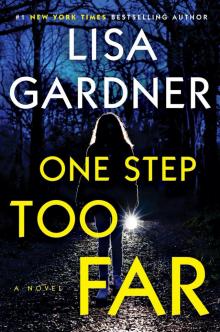 One Step Too Far
One Step Too Far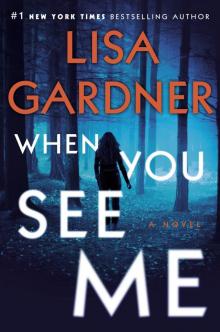 When You See Me
When You See Me Never Tell
Never Tell Touch & Go
Touch & Go The Survivors Club
The Survivors Club MacNamara's Woman
MacNamara's Woman Love You More: A Novel
Love You More: A Novel Gone
Gone The Perfect Husband
The Perfect Husband Maggie's Man: A Family Secrets
Maggie's Man: A Family Secrets The 7th Month
The 7th Month The Neighbor
The Neighbor Hide
Hide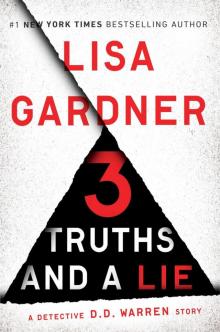 3 Truths and a Lie
3 Truths and a Lie Catch Me
Catch Me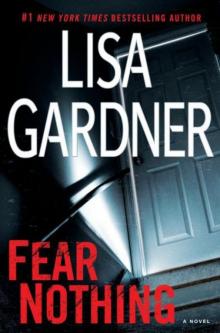 Fear Nothing: A Detective
Fear Nothing: A Detective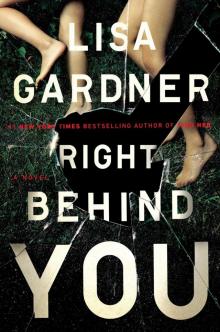 Right Behind You
Right Behind You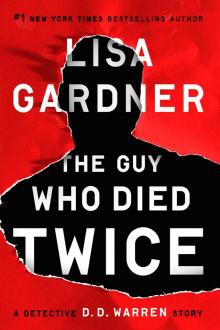 The Guy Who Died Twice
The Guy Who Died Twice Live to Tell: A Detective D.D. Warren Novel
Live to Tell: A Detective D.D. Warren Novel Live to Tell
Live to Tell Maggie's Man: A Family Secrets Novel
Maggie's Man: A Family Secrets Novel The Other Daughter
The Other Daughter Alone
Alone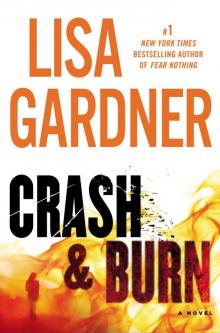 Crash & Burn
Crash & Burn The Detective D. D. Warren Series 5-Book Bundle
The Detective D. D. Warren Series 5-Book Bundle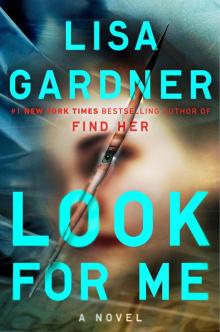 Look for Me
Look for Me Love You More
Love You More The FBI Profiler Series 6-Book Bundle
The FBI Profiler Series 6-Book Bundle The Third Victim (Quincy / Rainie)
The Third Victim (Quincy / Rainie) Say Goodbye
Say Goodbye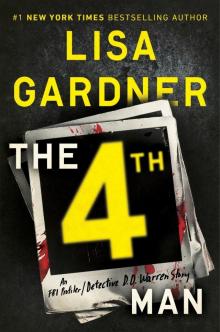 The 4th Man
The 4th Man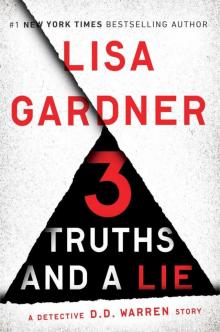 3 Truths and a Lie: A Detective D. D. Warren Story (Kindle Single)
3 Truths and a Lie: A Detective D. D. Warren Story (Kindle Single) Brandon's Bride
Brandon's Bride